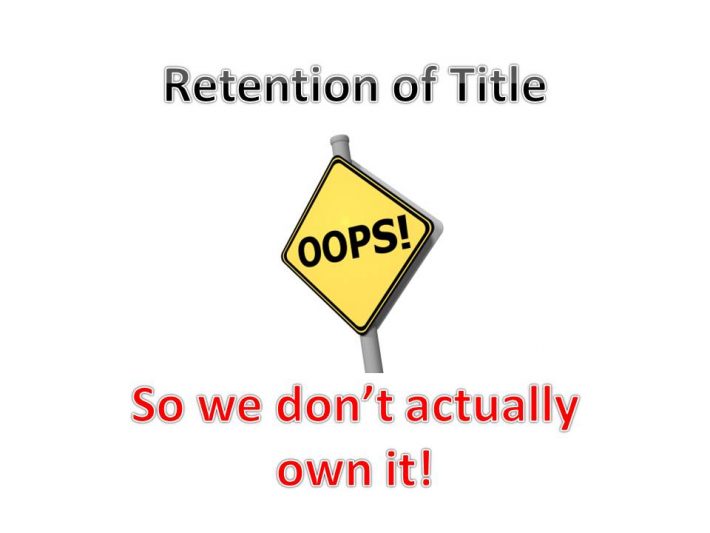
RETENTION OF TITLE – PROCUREMENT ACTIONS (2)
This is the second part of our Article on retention of Title, the first can be read here
An actual clause is always worth studying for its procurement implications. The following clause is headed ‘Title’. It reads:
1.1 Title to the goods shall pass to the Purchaser upon payment in full of the invoice price. [This is quite clear in its implications although we should bear in mind that some companies take 3/6 months to pay their suppliers, often in breach of the payment obligations].
1.2 The Purchaser shall hold the Goods as agent for the Seller until either:-
(i) Title has passed in accordance with paragraph 1.1 or
(ii) The event referred to in paragraph 1.5 has occurred [The astute buyer will, of course, read avidly 1.5 – when it is read it has potentially horrendous implications]
1.3 Until the occurrence of either such event:-
(i) The Purchaser shall [this creates an obligation on the buyer]
(a) Keep the Goods separate and distinct from any other goods of the Purchaser [This is an obligation that creates operational requirements for storage and accounting for stock]
(b) Inform the Seller of any intended resale or delivery of the Goods to a third party and inform such third party of the terms of these conditions [When this sub-clause is read carefully the practical implications of complying with this are manifestly, nigh impossible. Our client sells specialist goods and would have to inform every customer that what they are purchasing includes items for which they do not have title]
(c)keep the monies received in respect of any such resale or delivery separate from the Purchaser’s money and account to the Seller for such monies as agent to the extent of any sum that is due to the Seller [This has serious implications for the Finance Director, if indeed, there is any intention of complying with this obligation]
(ii) the Seller shall be entitled at any time after the expiration of 30 days or such longer period of credit, as shall have been agreed in writing by the Seller from the delivery of the Goods to enter upon the Purchaser’s premises and obtain the Goods [Who would agree to such a severe obligation? You may be amazed that it is being agreed by default. The operational implications are severe if only work-in-progress is considered]
1.4 If the Purchaser manufactures or fabricates a product from a combination or mixture of the Goods (using no other goods) all the provisions of paragraphs 1 to 1.3 of this Condition shall nevertheless apply [This applies to our client and has very practical implications]
1.5 If the Purchaser manufactures or fabricates a product from a combination or mixture of the Goods and the Purchaser’s and/or other goods when the sum remains due from the Purchaser to the Seller then the said product and proceeds of sale thereof and the property from time to time representing the same shall stand charged by way of fixed equitable charge with the said sum [We pointed out above that this has horrendous implications for the buying organisation – ask any Finance Director!]
Well, that is a real clause. It could be asked why would a buyer accept the clause? In our situation, he didn’t know. Why would a Finance Director accept the clause? In our situation, because he didn’t know.
If you are in procurement or finance, we urge a review of your attitude and policy on Romalpa.

